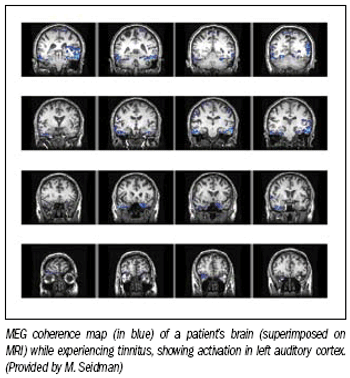
Researchers in Michigan are using magnetoencephalography of the brain to identify the source of tinnitus, a chronic ringing or buzzing in the ears or inside one's head.

Researchers in Michigan are using magnetoencephalography of the brain to identify the source of tinnitus, a chronic ringing or buzzing in the ears or inside one's head.

Radiologists and other physicians are feeling the frustration of losing a key Senate vote that would have erased an impending 21% Medicare rate cut and killed the sustainable growth rate policy that has forced Congress to delay other planned rate reductions for each of the past seven years.

Imaging experts are lining up to caution physicians not to read too much into study findings suggesting that chest CT is better than general radiography for examining A-H1N1 flu patients.

Findings from a large multicenter study by U.S. researchers suggest 64-slice CT angiography is better suited to detect nonobstructive but otherwise clinically relevant coronary artery plaques in patients with diabetes than are other cardiac diagnostic tests.

The possibility that radiologists will score a major victory in healthcare reform legislation grew stronger this week with the endorsement of a proposal to link physicians’ pay to the use of appropriateness criteria in the ordering of imaging studies. The last-minute addition to the Senate Finance Committee reform bill was approved by the panel Oct. 13 and will be debated with the rest of the reform bill on the Senate floor, mostly likely next week.

Findings of a study by researchers in Italy suggest C-11 choline PET/CT could diagnose prostate cancer recurrence sooner than transrectal ultrasound, CT, MRI, or bone scintigraphy in patients who have undergone radical prostatectomy.

Health authorities in New Brunswick, Canada, will reexamine 30,000 imaging exams interpreted since 2007 by a radiologist based in the province’s northwestern area who is under investigation for alleged incompetence.

A proposal that could allow higher payments for physicians who refer patients in accordance with appropriateness criteria has been added to a healthcare reform bill now before the Senate Finance Committee.
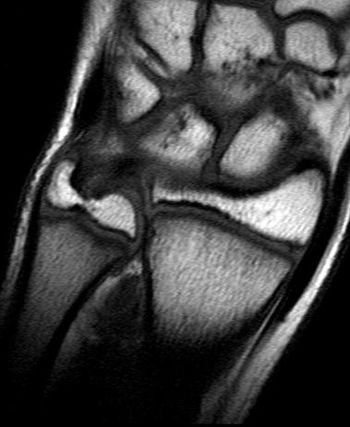
MRI has been adopted as a definitive measure for fair play by the International Federation of Association Football, the governing body for international soccer competition. FIFA will launch a program of random MRI wrist screening to verify the age of players competing in the Under-17 World Cup hosted by Nigeria Oct. 24 through Nov. 15.

Teleradiology's aggressive move into day read business gives hospitaladministrators a 'nuclear option' against defiant hospital-based radiologists
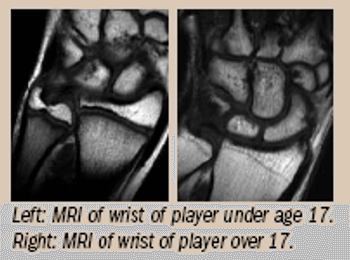
MRI has been adopted by the International Federation of Association Football as a definitive measure to ensure fair play.
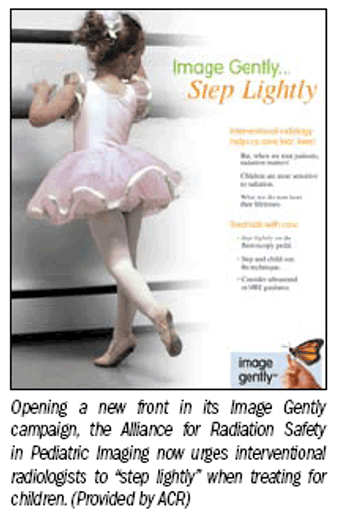
Expansion of the Image Gently radiation reduction campaign to interventional radiology has coincided with a disturbing study from the International Atomic Energy Agency indicating that image-guided interventions performed in developing countries are exposing patients to extraordinary levels of ionizing radiation.

Thanks to a near-perfect performance in a large cohort study in China, 64-slice CT angiography has shown it could replace digital subtraction angiography as the modality of choice for detecting suspected brain aneurysms at risk of spontaneous subarachnoid hemorrhage.

The merger of two large radiology groups in North Carolina will create one of the largest radiology practices in the nation. A benefit of the consolidation will be a comprehensive network of subspecialty, around-the-clock radiology services, group officials said.

A legislative attempt to eliminate in-office imaging self-referral remains alive, even though an attempt this week to add it to a comprehensive health reform bill in the House Energy and Commerce Committee failed.

Researchers in Germany and the Netherlands have discovered ultrasound-based patterns that can accurately diagnose the presence and stage of metastases in patients with melanoma. Sonography, they say, could replace surgical biopsies and predict patient survival.

Comprehensive healthcare reform legislation rolled out by the Senate Finance Committee this week moved the debate closer to what radiologists and image service operators would consider a reasonable formula for the regulation of reimbursement and clinical practices.

Coronary artery stenosis assessed by CT angiography is a more reliable predictor of major short-term cardiac events-including intervention, heart attacks, and death-than is coronary calcium scoring, according to a study by researchers at a hospital in Michigan.

Partners Healthcare System in Boston has integrated CT contrast media guidelines into its electronic medical record to encourage physicians to comply with the safety standards and to cut costs for the hospitals in its network.
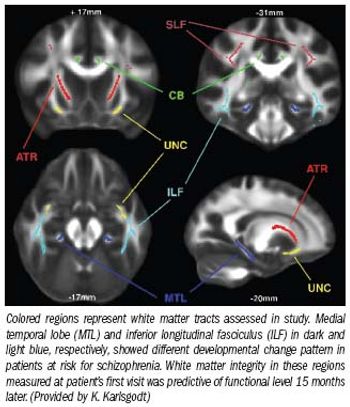
Using diffusion tensor imaging, California researchers have confirmed that the brain's white matter in subjects at risk for schizophrenia develops differently compared with that in healthy people. DTI scans of white matter integrity can also predict functional decline.

If it becomes law, a bill currently sitting in Congress designed to increase breast cancer awareness and prevention among women aged 15 to 39 could lead to a significant jump in the number of screening exams. Whether these exams would be medically warranted or just motivated by fear, breast imagers say, is open to question.

Interventional radiology providers in the U.S. and abroad will be asked to remember something simple but fairly important when caring for pediatric patients from now on: Step lightly.

Scores of radiologists from private imaging centers in the New York City metro area and thousands of their patients have organized to pressure their representatives in Congress for support in preserving access to imaging services. Their approach targets key players dealing with health care reform.

Findings from a Washington, DC, study suggest that cardiac CT performed before repeat cardiac surgical revascularization may lead to safer and more cost-effective operations. Preoperative CT was also linked to a higher likelihood of improved peri- and postoperative outcomes in these patients.

The booming growth of fluoro-guided minimally invasive interventional procedures in developing countries is exposing the adults and children receiving treatment to extraordinary levels of ionizing radiation, according to the International Atomic Energy Agency.

Radiologists and cardiologists who meet image interpretation requirements for cardiac CT competence certification do equally well on the test, according to results of the first Cardiac CT Board Examination. Board exam results also hint that actual clinical experience counts more toward passing scores than does medical education.

Has the sight of a morbidly obese person making his or her way down a supermarket aisle ever led you to wonder what all that weight is doing to the person’s knees? Data from a study supported by the National Institute on Aging indicates it’s probably doing a lot of cartilage damage.

Findings from a survey of 100 imaging centers suggest that MRI scanning facilities, particularly those run independently from hospitals, lack basic infection-control procedures. Patients and staff could be at risk of contracting and spreading life-threatening diseases during MRI exams.

Blue Dog Democrats on the House Energy and Commerce subcommittee on health were credited Friday with combating liberal proposals arising during protracted deliberations that would have cut physician pay. No action was taken on an amendment that would have banned in-office imaging physician self-referral.
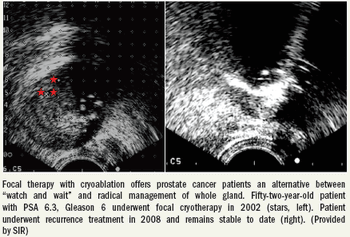
More than a decade's worth of data suggest cryoablation can treat localized malignancies within the prostate more safely and effectively than do the standard treatment approaches that are generally applied to the whole gland.